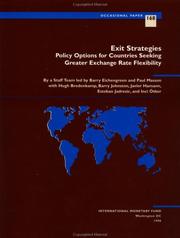| Listing 1 - 2 of 2 |
Sort by
|

ISBN: 1280356162 9786610356164 9264007954 9264007946 Year: 2005 Publisher: Paris : OECD Publishing,
Abstract | Keywords | Export | Availability | Bookmark
 Loading...
Loading...Choose an application
- Reference Manager
- EndNote
- RefWorks (Direct export to RefWorks)
Social policy is often disparaged as being a burden on society, but this book shows that well-designed social protection can be an asset that is critical for sustaining social development. To fulfill its potential, however, social protection now needs to recognise new needs of individuals and families, and new constraints on their functioning. Successful programmes will require new means to attain their goals, to leverage the initiatives of a broad range of actors, and to involve clients at every stage in the design and delivery of programmes. In examining these questions, this fact-filled report stresses the importance of shifting the focus of social programmes from insuring individuals against a few, well-defined contingencies towards investing in their capabilities and making use of them to the best of their potential at every stage of the life course. It also underscores the importance of broadening the roles played by individuals, employers and trade unions, as well as profit and not-for-profit providers of social services. The book opens with a comprehensive assessment of the situation in OECD countries, comparing levels of poverty, social isolation, and social spending and indicators such as fertility rates, divorce rates, and distribution of household types (single, single parents, couples without children, couples with children). In Part II of the book, issues relating to families and children are explored, with interesting data provided on gender gaps in employment and earnings, time spent by men and women on child care, maternity and parental leave, and family poverty. The third part of the book examines poverty among prime-aged persons and includes extensive information on social assistance and disability. The final part of the book examines social issues faced by older people and includes interesting information on employment of older people, effective ages of retirement in different countries, training of older employees, pensions, and long-term care.
Social planning. --- Social planning --- Social policy --- Older people --- Poor --- Family policy --- Sociology & Social History --- Social Sciences --- Social Conditions --- Families --- Families and state --- State and families --- Disadvantaged, Economically --- Economically disadvantaged --- Impoverished people --- Low-income people --- Pauperism --- Poor, The --- Poor people --- Aged --- Aging people --- Elderly people --- Old people --- Older adults --- Older persons --- Senior citizens --- Seniors (Older people) --- National planning --- State planning --- Social development planning --- Government policy --- Economic conditions --- Public welfare --- Social security --- Persons --- Social classes --- Poverty --- Age groups --- Gerontocracy --- Gerontology --- Old age --- Economic policy --- Social history --- Planning --- Social policy. --- OECD countries --- OECD member countries --- Organisation for Economic Co-operation and Development countries


ISBN: 1557757348 1462331025 1452740909 9781557757340 Year: 1998 Volume: 168 Publisher: Washington, D.C. : International Monetary Fund,
Abstract | Keywords | Export | Availability | Bookmark
 Loading...
Loading...Choose an application
- Reference Manager
- EndNote
- RefWorks (Direct export to RefWorks)
In a world of increasing capital mobility and broadening and more diversified trade, many (but not all) developing and transition economies are likely to find it desirable to move from relatively fixed exchange rate regimes to regimes of greater exchange rate flexibility. This paper suggests why, and considers strategies that countries may consider for such a move. It reinforces this discussion with a review of experience from teh past two decades with alternative exchange rate regimes. The paper also identifies policies that can facilitate the transition to greater exchange rate flexibility for countries that wish to pursue this option.
International finance --- Developing countries --- Monetary policy --- Fiscal policy --- Foreign exchange rates --- 339.74 <1-773> --- 336.74 <1-773> --- -Foreign exchange rates --- -Monetary policy --- -monetair beleid --- ontwikkelingslanden --- wisselkoersbeleid --- chili --- israel --- mexico --- polen --- AA* / International - Internationaal --- 333.451.6 --- 333.451.1 --- 330.05 --- 332.456 --- Monetary management --- Economic policy --- Currency boards --- Money supply --- Exchange rates --- Fixed exchange rates --- Flexible exchange rates --- Floating exchange rates --- Fluctuating exchange rates --- Foreign exchange --- Rates of exchange --- Tax policy --- Taxation --- Finance, Public --- Monetaire buitenlandse politiek. Deviezenpolitiek--Gebieden in ontwikkeling. Ontwikkelingslanden --- Geld. Geldwezen. Monetaire sector.--Gebieden in ontwikkeling. Ontwikkelingslanden --- politique de taux de change --- mexique --- pologne --- Vlottende wisselkoersen. Crawling peg. --- Wisselkoersen. --- Rates --- Government policy --- Working papers --- 336.74 <1-773> Geld. Geldwezen. Monetaire sector.--Gebieden in ontwikkeling. Ontwikkelingslanden --- 339.74 <1-773> Monetaire buitenlandse politiek. Deviezenpolitiek--Gebieden in ontwikkeling. Ontwikkelingslanden --- monetair beleid --- Wisselkoersen --- Vlottende wisselkoersen. Crawling peg --- Foreign exchange rates. --- Monetary policy. --- Fiscal policy. --- Monetary policy - Developing countries --- Fiscal policy - Developing countries --- Foreign exchange rates - Developing countries --- Banks and Banking --- Exports and Imports --- Finance: General --- Foreign Exchange --- Money and Monetary Policy --- Monetary Systems --- Standards --- Regimes --- Government and the Monetary System --- Payment Systems --- International Investment --- Long-term Capital Movements --- Development Planning and Policy: Trade Policy --- Factor Movement --- Foreign Exchange Policy --- International Financial Markets --- Currency --- Monetary economics --- International economics --- Finance --- Financial services law & regulation --- Exchange rate arrangements --- Exchange rate flexibility --- Currencies --- Conventional peg --- Money --- Capital movements --- Foreign exchange market --- Financial risk management --- United States
| Listing 1 - 2 of 2 |
Sort by
|

 Search
Search Feedback
Feedback About
About Help
Help News
News